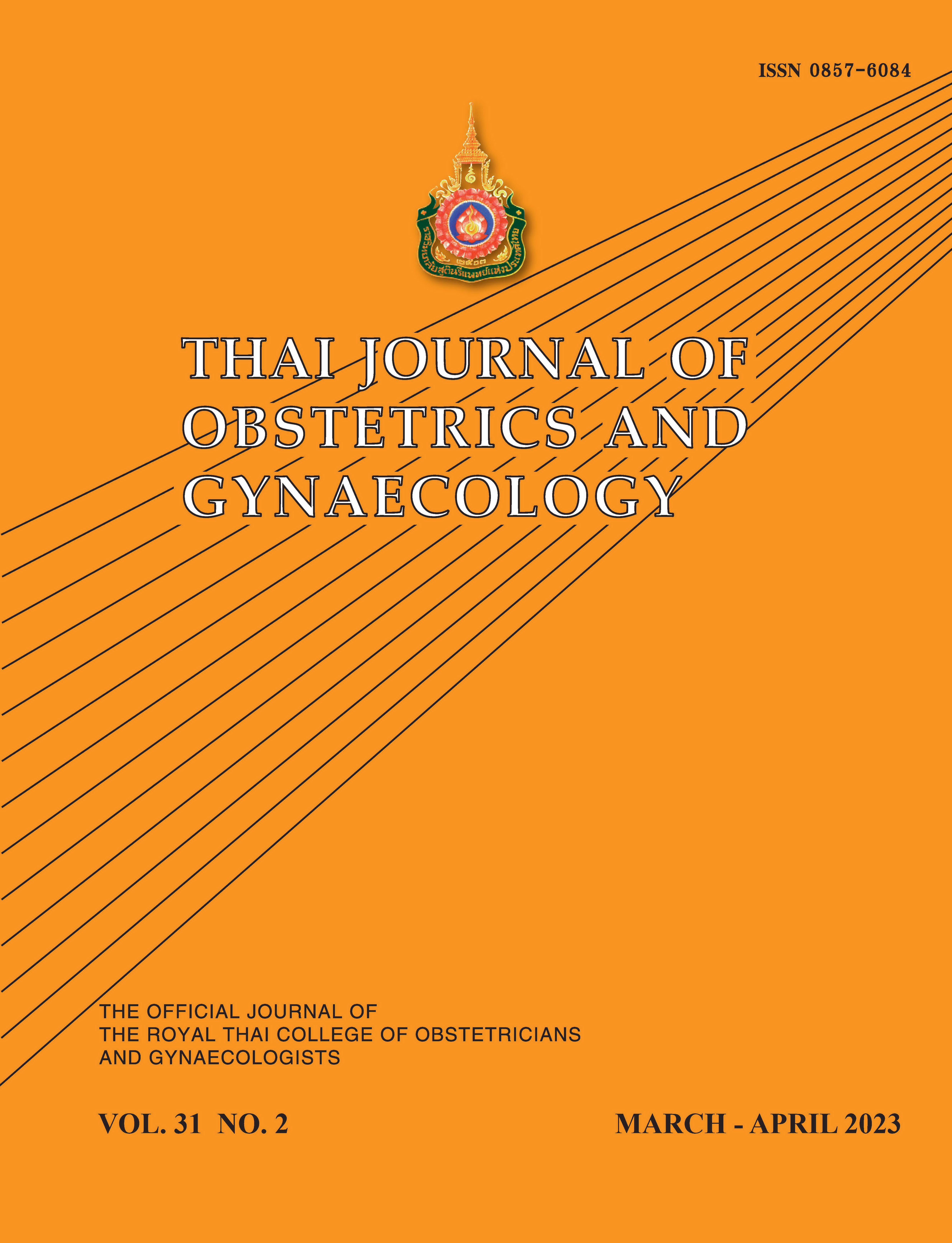Asymptomatic Bacteriuria in Thai Pregnant Women with Preterm Delivery: Prevalence, Pathogens and Pregnancy Outcomes
Main Article Content
Abstract
Objectives: The primary aim was to determine the prevalence of asymptomatic bacteriuria (ASB) in Thai pregnant women with a preterm delivery. The secondary aims were to identify common causative organisms and their antibiotic susceptibilities, and to compare the pregnancy outcomes between ASB-positive and ASB-negative patients.
Materials and Methods: The medical records of low-risk pregnant women with a preterm delivery at Siriraj Hospital from January 2014 to May 2020 were reviewed. Patient characteristics, urine culture results, and pregnancy outcome data were recorded. ASB-positive was defined as the growth of at least 105 colony-forming units per milliliter (cfu/ml) isolated from a midstream, clean-catch urine specimen.
Results: A total of 826 eligible women were included. The prevalence of ASB was 3% (25/826). The predominant organism was Escherichia coli (E. coli) (48%). All E. coli were susceptible to nitrofurantoin and only 25% were susceptible to ampicillin. No significant adverse outcomes were detected in the ASB-positive group.
Conclusion: The prevalence of ASB in Thai pregnant women with a preterm delivery was low. Antibiotic treatment should be based on the common organisms and local antibiotic susceptibility patterns.
Article Details

This work is licensed under a Creative Commons Attribution-NonCommercial-NoDerivatives 4.0 International License.
References
Colgan R, Jaffe GA, Nicolle LE. Asymptomatic bacteriuria. Am Fam Physician 2020;102:99-104.
Glaser AP, Schaeffer AJ. Urinary tract infection and bacteriuria in pregnancy. Urol Clin North Am 2015;42:547-60.
Imade PE, Izekor PE, Eghafona NO, Enabulele OI, Ophori E. Asymptomatic bacteriuria among pregnant women. N Am J Med Sci 2010;2:263-6.
Nicolle LE, Gupta K, Bradley SF, Colgan R, DeMuri GP, Drekonja D, et al. Clinical practice guideline for the management of asymptomatic bacteriuria: 2019 update by the Infectious Diseases Society of America. Clin Infect Dis 2019;68:e83-e110.
Smaill FM, Vazquez JC. Antibiotics for asymptomatic bacteriuria in pregnancy. Cochrane Database Syst Rev 2015:CD000490.
Farazi A, Jabbariasl M. Asymptomatic bacteriuria in pregnancy in the central region of Iran: frequency, risk Factors, and causative organisms. Clin Epidemiol Glob Health 2019;7:309-12.
Wingert A, Pillay J, Sebastianski M, Gates M, Featherstone R, Shave K, et al. Asymptomatic bacteriuria in pregnancy: systematic reviews of screening and treatment effectiveness and patient preferences. BMJ Open 2019;9:e021347.
Moore A, Doull M, Grad R, Groulx S, Pottie K, Tonelli M, et al. Recommendations on screening for asymptomatic bacteriuria in pregnancy. CMAJ 2018;190:E823-E30.
Sujatha R, Nawani M. Prevalence of asymptomatic bacteriuria and its antibacterial susceptibility pattern among pregnant women attending the antenatal clinic at kanpur, India. J Clin Diagn Res 2014;8:DC01-3.
Cunningham FG, Leveno KJ, Bloom SL, Spong CY, Dashe JS, Hoffman BL, et al. Renal and urinary tract disorders. In: Cunningham FG, Leveno KJ, Bloom SL, Dashe JS, Hoffman BL, Casey BM, et al, editors. Williams Obstetrics. 25th ed. New York: McGraw-Hill Education 2018:803-34.
Antepartum care. In: American Academy of Pediatrics, American College of Obstetricians and Gynecologists. Guidelines for perinatal care. 8th ed. Washington, DC: American Academy of Pediatrics 2017:149-226.
NICE (National Institute for Health and Care Excellence). Antenatal care for uncomplicated pregnancies. Clinical guideline 62. United Kingdom: NICE; 2019 [cited 2021 Jul 15]. Available from: https://www.nice.org.uk/guidance/cg62.
WHO Reproductive Health Library. WHO recommendation on the method for diagnosing asymptomatic bacteriuria in pregnancy (December 2016). The WHO Reproductive Health Library; Geneva: World Health Organization. [cited 2021 Jul 15]. Available from: https://extranet.who.int/rhl/topics/preconception-pregnancy-childbirth-and-postpartum-care/antenatal-care/who-recommendation-method-diagnosing-asymptomatic-bacteriuria-pregnancy.
WHO Reproductive Health Library. WHO recommendation on antibiotics for asymptomatic bacteriuria (December 2016). The WHO Reproductive Health Library; Geneva: World Health Organization. [cited 2021 Jul 15]. Available from: https://extranet.who.int/rhl/topics/preconception-pregnancy-childbirth-and-postpartum-care/antenatal-care/who-recommendation-antibiotics-asymptomatic-bacteriuria.
Force USPST, Owens DK, Davidson KW, Krist AH, Barry MJ, Cabana M, et al. Screening for asymptomatic bacteriuria in adults: US Preventive Services Task Force recommendation statement. JAMA 2019;322:1188-94.
Kovavisarach E, Vichaipruck M, Kanjarahareutai S. Risk factors related to asymptomatic bacteriuria in pregnant women. J Med Assoc Thai 2009;92:606-10.
Celen S, Oruc AS, Karayalcin R, Saygan S, Unlu S, Polat B, et al. Asymptomatic bacteriuria and antibacterial susceptibility patterns in an obstetric population. ISRN Obstet Gynecol 2011;2011:721872.
Kamel HAH, Hegab MHM, Al-sehrawey, Hassan HM. Prevalence of asymptomatic bacteriuria in patients with preterm labor. Egypt. J.Hosp. Med 2018;73:7444-47.
Chongsomchai C, Piansriwatchara E, Lumbiganon P, Pianthaweechai K. Risk factors for asymptomatic bacteriuria in pregnant women. Srinagarind Med J 1997;12:69-73.
Ghafari M, Baigi V, Cheraghi Z, Doosti-Irani A. The Prevalence of asymptomatic bacteriuria in Iranian pregnant women: a systematic review and meta-analysis. PLoS One 2016;11:e0158031
Diorio de Souza H, Hase EA, Knippel Galletta MA, Rodrigues Mota Diorio G, Lippi Waissman A, Pulcineli Vieira Francisco R, et al. Urinary bacterial profile and antibiotic susceptibility in pregnant adolescents and pregnant low obstetric risk adult women. Infect Drug Resist 2021;14:2829-41.


